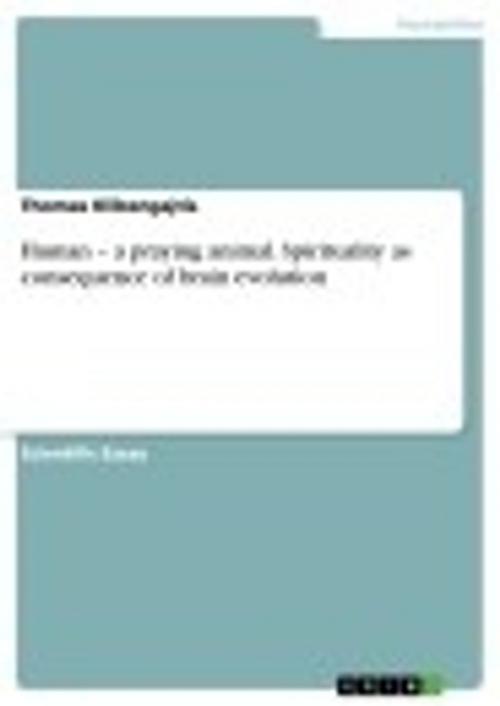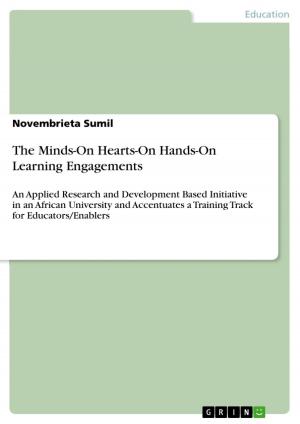Human - a praying animal. Spirituality as consequence of brain evolution
Nonfiction, Religion & Spirituality, Philosophy| Author: | Thomas Klibengajtis | ISBN: | 9783656156789 |
| Publisher: | GRIN Verlag | Publication: | March 21, 2012 |
| Imprint: | GRIN Verlag | Language: | English |
| Author: | Thomas Klibengajtis |
| ISBN: | 9783656156789 |
| Publisher: | GRIN Verlag |
| Publication: | March 21, 2012 |
| Imprint: | GRIN Verlag |
| Language: | English |
Scientific Essay from the year 2009 in the subject Philosophy - Miscellaneous, , course: The Venice School on Science and Religion 2009, zum Thema 'Evolution and Human Uniqueness' (26.05-30.05. 2009)., language: English, abstract: The human uniqueness consists, from the biological point of view, in a complexity of brain, which enables humans to transcend their biological belonging to the world of evolution. This cerebral complexity allows us to develop the consciousness of self which results both in the fear of death and in the sense of transcendence together with its cultic consequences, such as prayer and offering, every religion consists of. By adopting the monistic perspective according to which 'matter' and 'spirit' are considered as two aspects of reality, not as two independent and incompatible substances, any problem to accept that biological evolution culminates in encephalization and spiritualization (Teilhard) will be resolved. In order to prove this thesis some hard proves from neurosciences and evolution will be adduced. Due to the recent brain research some neuronal correlates of different religious experiences can be detected. All these experiences involve brain areas (lateral prefrontal region, Brodmann's areas 39 and 40 in the inferior parietal lobe in cooperation the cortico-striato-pallido-thalamocortical system) unique to the species homo sapiens. It seems that only humans are cerebral capable of transcendence, since God, guiding the evolution, wanted them to be 'religious animals.'
Scientific Essay from the year 2009 in the subject Philosophy - Miscellaneous, , course: The Venice School on Science and Religion 2009, zum Thema 'Evolution and Human Uniqueness' (26.05-30.05. 2009)., language: English, abstract: The human uniqueness consists, from the biological point of view, in a complexity of brain, which enables humans to transcend their biological belonging to the world of evolution. This cerebral complexity allows us to develop the consciousness of self which results both in the fear of death and in the sense of transcendence together with its cultic consequences, such as prayer and offering, every religion consists of. By adopting the monistic perspective according to which 'matter' and 'spirit' are considered as two aspects of reality, not as two independent and incompatible substances, any problem to accept that biological evolution culminates in encephalization and spiritualization (Teilhard) will be resolved. In order to prove this thesis some hard proves from neurosciences and evolution will be adduced. Due to the recent brain research some neuronal correlates of different religious experiences can be detected. All these experiences involve brain areas (lateral prefrontal region, Brodmann's areas 39 and 40 in the inferior parietal lobe in cooperation the cortico-striato-pallido-thalamocortical system) unique to the species homo sapiens. It seems that only humans are cerebral capable of transcendence, since God, guiding the evolution, wanted them to be 'religious animals.'















